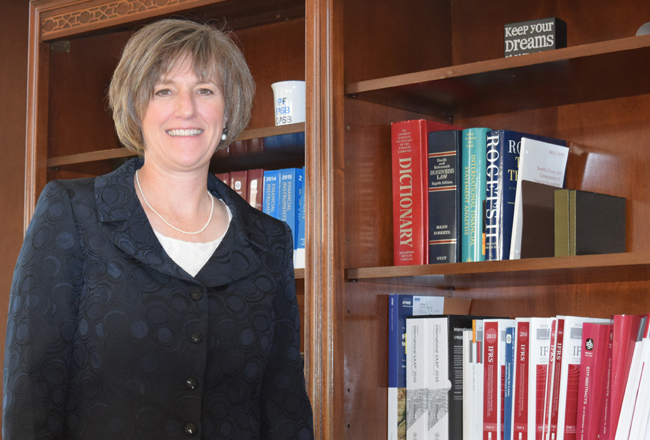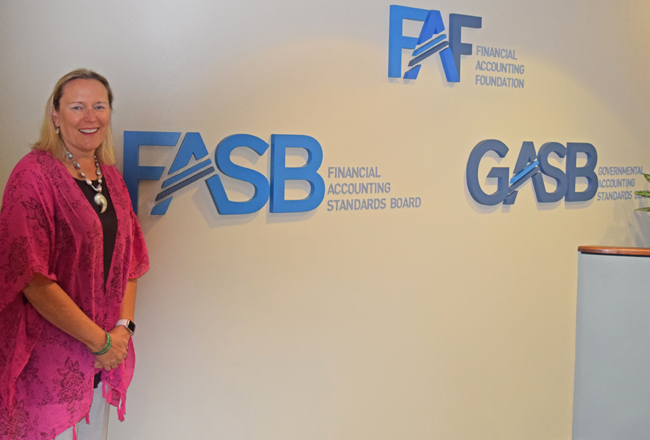For most people, the concept of cloud computing might raise questions about high-tech efficiencies and potential cybersecurity risks. For Susan M. Cosper, cloud computing is less about bits and bytes and more about dollars and cents.

“What do you do with the implementation costs associated with a cloud computing arrangement?” said Cosper, technical director at the Financial Accounting Standards Board (FASB) and chairwoman of the board”™s Emerging Issues Task Force. “There are a number of costs. Do you capitalize them on your balance sheet? Do you expense them in your income statement? Or is there some hybrid where some costs are capitalized and some costs are expensed?”
FASB is deliberating on creating accounting standards that apply to how the private sector itemizes the cloud-computing software solution. FASB and its public sector-facing counterpart, the Governmental Accounting Standards Board (GASB), operate within the Norwalk-based Financial Accounting Foundation (FAF), an independent nonprofit that oversees and supports the two boards that set and update the nation”™s financial accounting and reporting standards.
Financial Accounting Foundation President and CEO Terri Polley said that the U.S. example of having those standards set by a nongovernmental entity is an exception to the approach taken by other countries. “In many jurisdictions, the securities regulator sets the standard,” she said. “The one that is most similar to ours is the International Accounting Standards Board ”” they are based in London and modeled after our structure. But they are different because they set global standards and countries decide whether or not to adopt them.”

Photos by Phil Hall
Still, U.S. law requires that most entities follow the standards. “For companies that list on public exchanges, they are mandatory,” Polley said of the FASB standards. “If they want to have audited financial statements that indicate their statements are prepared in accordance with Generally Accepted Accounting Principles (GAAP), they are mandatory. The ones that don”™t necessarily have to follow GAAP are private companies, but they may have another basis of accounting because their bank lender doesn”™t require GAAP financial statements.”
As for the Governmental Accounting Standards Board, adherence to its standards covers nearly all of the country. “All 50 states and over 30,000 governmental units, from the city of New York to small villages, follow these standards,” said David R. Bean, GASB”™s director of research and technical activities. “It covers over 85 percent of total expenditures of state and local governments.”
Bean noted the federal government adheres to the guidance of the Federal Accounting Standards Advisory Board.
Neither FASB nor GASB work on a set schedule or quantity of standards for a specific time period. “We have a number of standards that we are currently working on,” Cosper said. “In a few weeks, we will be issuing final standards on improvements to hedge accounting, which is very welcomed by companies who choose to hedge certain transactions. We are also looking at improvements to long-duration insurance contracts.”
The GASB projects include updating the financial reporting model that was first introduced in 1999. “It was time to take a fresh look to determine if the financial statements are meeting the needs of users of those statements,” said Bean.
“Government is not in the business to make a profit,” he added. “Government is in the business of providing services, and there is a need for financial statements to be structured to in a manner that reports how efficiently services are being provided.”
Polley observed that many FASB and GASB standards are continual works in progress. “The FASB and GASB monitor how standards are implemented and respond accordingly to review and revise if necessary,” she said.
Requests for new or updated standards are frequently submitted by unsolicited sources. “We get letters from companies, auditors, individuals and academics,” said Cosper, noting that the effort to establish an accounting standard for cloud computing came from an agenda request to the FASB website.
“The accounting guidance hasn”™t necessarily kept pace with that technological change,” Cosper said. “In this instance, we have a lot of guidance on when you capitalize costs in a software arrangement. But there is a lot of diversity in the implementation for cloud computing arrangements. That was brought to our attention as something that potentially needed to be improved.”
FASB is funded through accounting support fees collected from public market equity issuers and investment company issuers, while GASB”™s funds come via accounting support fees collected from municipal bond broker-dealers. The latter is of particular concern to FAF officials because GASB”™s funding was set in the Dodd-Frank Act of 2010, which is the focus of a repeal effort spearheaded by Republicans in Congress.
“We are working to make sure the mechanism for the GASB funding in Dodd-Frank does not get repealed,” Polley said.
Also of concern to FAF is the continual renewal of its leadership team. A search is underway for a new board member at FASB ”” Polley said that could take a year to fill ”” and three members of the FAF board of trustees have terms expiring at the end of this year.
Polley said the search criteria are very specific, with new board members offering an independent viewpoint rather than a partisan ideology. “We want the standards to be neutral to reflect the underlying economics of a transaction. We don”™t want them to reflect any special interests. That”™s one reason why it”™s important for all of our stakeholders to participate in the process,” she said.






















